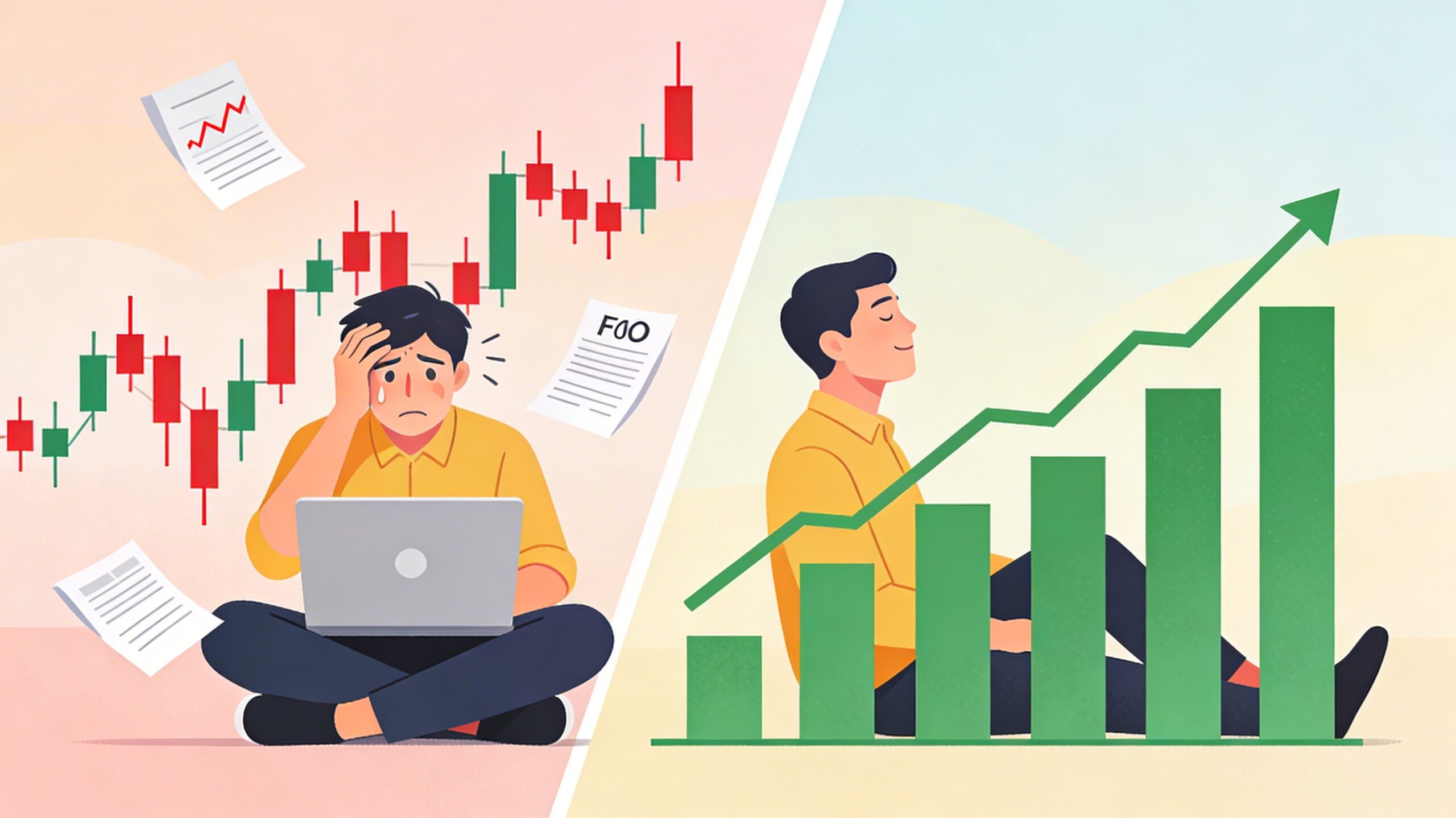
#MutualFunds #DirectVsRegular #InvestmentGuide #MoneyPsychology #PersonalFinance #ExpenseRatio #TaxPlanning #SIP #WealthCreation #FinancialLiteracy
म्यूचुअल फंड आपके लिए सबसे अच्छा कौन सा है? | मनी साइकोलॉजी
परिचय
म्यूचुअल फंड निवेश का एक लोकप्रिय तरीका है, लेकिन सही फंड चुनना हर निवेशक के लिए चुनौतीपूर्ण हो सकता है। “Money Psychology” वीडियो के अनुसार, अधिकतर लोग रेगुलर फंड चुनते हैं, जिससे उनकी रिटर्न पर बड़ा असर पड़ता है। इस लेख में हम विस्तार से जानेंगे कि डायरेक्ट और रेगुलर फंड में क्या अंतर है, एक्सपेंस रेशियो क्या है, टैक्स और एग्जिट लोड के प्रभाव, और आपके लिए कौन सा फंड सबसे उपयुक्त है।
डायरेक्ट बनाम रेगुलर म्यूचुअल फंड: मूलभूत अंतर
डायरेक्ट फंड
-
निवेशक सीधे एसेट मैनेजमेंट कंपनी (AMC) के माध्यम से निवेश करता है।
-
कोई बिचौलिया या एजेंट नहीं होता, जिससे कमीशन नहीं लगता।
-
एक्सपेंस रेशियो कम होता है, जिससे लॉन्ग टर्म में रिटर्न अधिक मिलते हैं।
-
निवेशक को रिसर्च और फंड चयन खुद करना होता है।
रेगुलर फंड
-
निवेशक किसी एजेंट, बैंक या डिस्ट्रीब्यूटर के माध्यम से निवेश करता है।
-
एजेंट को कमीशन मिलता है, जो फंड के एक्सपेंस रेशियो में जुड़ जाता है।
-
निवेशक को सलाह और सुविधा मिलती है, लेकिन रिटर्न कम हो सकते हैं।
-
शुरुआती निवेशकों के लिए मार्गदर्शन अच्छा रहता है।
एक्सपेंस रेशियो क्या है और क्यों मायने रखता है?
एक्सपेंस रेशियो वह फीस है जो AMC आपके निवेश को मैनेज करने के लिए लेती है। डायरेक्ट फंड में यह फीस कम होती है, जबकि रेगुलर फंड में एजेंट का कमीशन जुड़ने से यह बढ़ जाती है।छोटा सा फर्क (जैसे 0.5% या 1%) भी लंबे समय में कंपाउंडिंग के कारण लाखों रुपये के फर्क में बदल सकता है। वीडियो में इसे एक्सपोनेंशियल ग्रोथ के उदाहरण से समझाया गया है—जैसे कागज को बार-बार डबल करने पर उसकी मोटाई कल्पना से कहीं ज्यादा बढ़ जाती है, वैसे ही फीस का असर भी समय के साथ बढ़ता जाता है।
टैक्स और एग्जिट लोड के प्रभाव
-
रेगुलर से डायरेक्ट फंड में स्विच करने पर आपको अपने पुराने फंड को बेचकर नए में निवेश करना पड़ता है, जिससे कैपिटल गेन टैक्स लग सकता है।
-
कुछ फंड्स में एग्जिट लोड भी लगता है, अगर आप एक निश्चित समय से पहले पैसे निकालते हैं।
-
ELSS (टैक्स सेविंग फंड) में 3 साल का लॉक-इन होता है, जिसमें स्विचिंग संभव नहीं है।
-
स्विचिंग से पहले टैक्स और एग्जिट लोड की गणना जरूर करें।
कौन सा फंड आपके लिए सही है?
यदि आप स्वयं रिसर्च कर सकते हैं:
-
डायरेक्ट फंड चुनें, क्योंकि इसमें कम फीस और अधिक रिटर्न की संभावना है।
-
ऑनलाइन प्लेटफॉर्म्स (जैसे Groww, Zerodha Coin, Paytm Money) से निवेश करें।
यदि आपको मार्गदर्शन चाहिए:
-
रेगुलर फंड चुनें, जहां एजेंट या डिस्ट्रीब्यूटर आपकी मदद करेगा।
-
शुरुआती निवेशकों के लिए यह सुरक्षित विकल्प हो सकता है।
निवेश के लिए फंड का चयन कैसे करें?
-
अपने निवेश लक्ष्य तय करें:
-
शॉर्ट टर्म (1-3 साल): लिक्विड या अल्ट्रा शॉर्ट टर्म फंड
-
मीडियम टर्म (3-5 साल): बैलेंस्ड या हाइब्रिड फंड
-
लॉन्ग टर्म (5+ साल): इक्विटी फंड
-
-
रिस्क प्रोफाइल समझें:
-
हाई रिस्क: स्मॉल/मिड कैप इक्विटी फंड
-
मीडियम रिस्क: बैलेंस्ड/हाइब्रिड फंड
-
लो रिस्क: डेट फंड, लिक्विड फंड
-
-
फंड का प्रदर्शन देखें:
-
पिछले 3, 5, 10 साल का रिटर्न
-
फंड मैनेजर का अनुभव
-
फंड हाउस की प्रतिष्ठा
-
-
एक्सपेंस रेशियो और अन्य फीस देखें:
-
कम एक्सपेंस रेशियो वाले फंड्स को प्राथमिकता दें।
-
-
SIP (Systematic Investment Plan) का लाभ उठाएं:
-
नियमित निवेश से मार्केट वोलैटिलिटी का असर कम होता है।
-
निवेश के मनोवैज्ञानिक पहलू
-
भीड़ का अनुसरण न करें, अपनी रिसर्च करें।
-
लॉन्ग टर्म निवेश में धैर्य रखें।
-
कंपाउंडिंग का जादू समय के साथ दिखता है।
-
भावनाओं में बहकर निवेश या रिडीम न करें।
2025 के लिए कुछ लोकप्रिय फंड्स (श्रेणी अनुसार)
इक्विटी फंड्स:
-
HDFC Mid-Cap Opportunities Fund
-
Motilal Oswal Midcap Fund
-
ICICI Prudential BHARAT 22 FOF
-
Nippon India Small Cap Fund
डेट फंड्स:
-
Invesco India Arbitrage Fund
-
Tata Arbitrage Fund
-
Bank of India Overnight Fund
हाइब्रिड फंड्स:
-
HDFC Hybrid Equity Fund
-
ICICI Prudential Equity & Debt Fund
ELSS (टैक्स सेविंग):
-
Mirae Asset ELSS Tax Saver Fund
-
Axis Long Term Equity Fund
निष्कर्ष
-
यदि आप निवेश के बारे में जानकारी रखते हैं और खुद निर्णय ले सकते हैं, तो डायरेक्ट फंड आपके लिए बेहतर हैं।
-
यदि आप गाइडेंस चाहते हैं, तो रेगुलर फंड चुनें।
-
हमेशा अपने निवेश लक्ष्य, रिस्क प्रोफाइल, और समयावधि के अनुसार फंड चुनें।
-
कंपाउंडिंग और कम फीस का लाभ उठाएं।
-
निवेश से पहले टैक्स और एग्जिट लोड की गणना जरूर करें।
Which Mutual Fund is Best for You? | Money Psychology
Introduction
Mutual funds are a popular investment tool, but choosing the right fund can be confusing. According to the “Money Psychology” video, most investors pick regular funds, which can significantly reduce their returns. This article explains the difference between direct and regular funds, the importance of expense ratio, tax and exit load implications, and how to select the best fund for your needs.
Direct vs Regular Mutual Funds: The Basics
Direct Funds
-
You invest directly with the Asset Management Company (AMC), with no intermediary.
-
No agent or distributor means no commission, resulting in a lower expense ratio.
-
Lower costs lead to higher long-term returns.
-
You must research and select funds yourself.
Regular Funds
-
You invest through an agent, bank, or distributor.
-
The agent receives a commission, which is added to the fund’s expense ratio.
-
You get guidance and support, but returns may be lower.
-
Suitable for beginners who need help.
What is Expense Ratio and Why Does It Matter?
The expense ratio is the fee charged by the AMC for managing your investment. Direct funds have a lower expense ratio, while regular funds have a higher one due to agent commissions.Even a small difference (like 0.5% or 1%) can compound over time and result in a significant difference in your final corpus. The video uses the example of exponential growth—just as doubling a sheet of paper quickly becomes unimaginably thick, small fees compound to large amounts over decades.
Tax and Exit Load Implications
-
Switching from regular to direct funds means selling your old fund and buying a new one, which may trigger capital gains tax.
-
Some funds have an exit load if you withdraw before a certain period.
-
ELSS (tax-saving funds) have a 3-year lock-in, so switching is not possible.
-
Always calculate tax and exit load before switching.
Which Fund is Right for You?
If You Can Do Your Own Research:
-
Choose direct funds for lower fees and higher returns.
-
Use online platforms (like Groww, Zerodha Coin, Paytm Money) for easy investing.
If You Need Guidance:
-
Choose regular funds, where an agent or distributor helps you.
-
This is a safer option for beginners.
How to Select a Mutual Fund for Investment?
-
Define Your Investment Goals:
-
Short-term (1-3 years): Liquid or ultra-short-term funds
-
Medium-term (3-5 years): Balanced or hybrid funds
-
Long-term (5+ years): Equity funds
-
-
Understand Your Risk Profile:
-
High risk: Small/Mid cap equity funds
-
Medium risk: Balanced/hybrid funds
-
Low risk: Debt funds, liquid funds
-
-
Check Fund Performance:
-
Look at 3, 5, and 10-year returns
-
Fund manager’s experience
-
Reputation of the fund house
-
-
Check Expense Ratio and Other Fees:
-
Prefer funds with a lower expense ratio.
-
-
Leverage SIP (Systematic Investment Plan):
-
Regular investing reduces the impact of market volatility.
-
Psychological Aspects of Investing
-
Don’t follow the crowd; do your own research.
-
Be patient for long-term gains.
-
The magic of compounding works over time.
-
Don’t let emotions drive your investment decisions.
Popular Funds for 2025 (By Category)
Equity Funds:
-
HDFC Mid-Cap Opportunities Fund
-
Motilal Oswal Midcap Fund
-
ICICI Prudential BHARAT 22 FOF
-
Nippon India Small Cap Fund
Debt Funds:
-
Invesco India Arbitrage Fund
-
Tata Arbitrage Fund
-
Bank of India Overnight Fund
Hybrid Funds:
-
HDFC Hybrid Equity Fund
-
ICICI Prudential Equity & Debt Fund
ELSS (Tax Saving):
-
Mirae Asset ELSS Tax Saver Fund
-
Axis Long Term Equity Fund
Conclusion
-
If you are knowledgeable and can make your own decisions, direct funds are better for you.
-
If you need guidance, choose regular funds.
-
Always select funds based on your investment goals, risk profile, and time horizon.
-
Take advantage of compounding and lower fees.
-
Always calculate tax and exit load before making changes.
आपका निवेश, आपकी समझ—सही फंड चुनें और अपने वित्तीय लक्ष्यों को हासिल करें!








